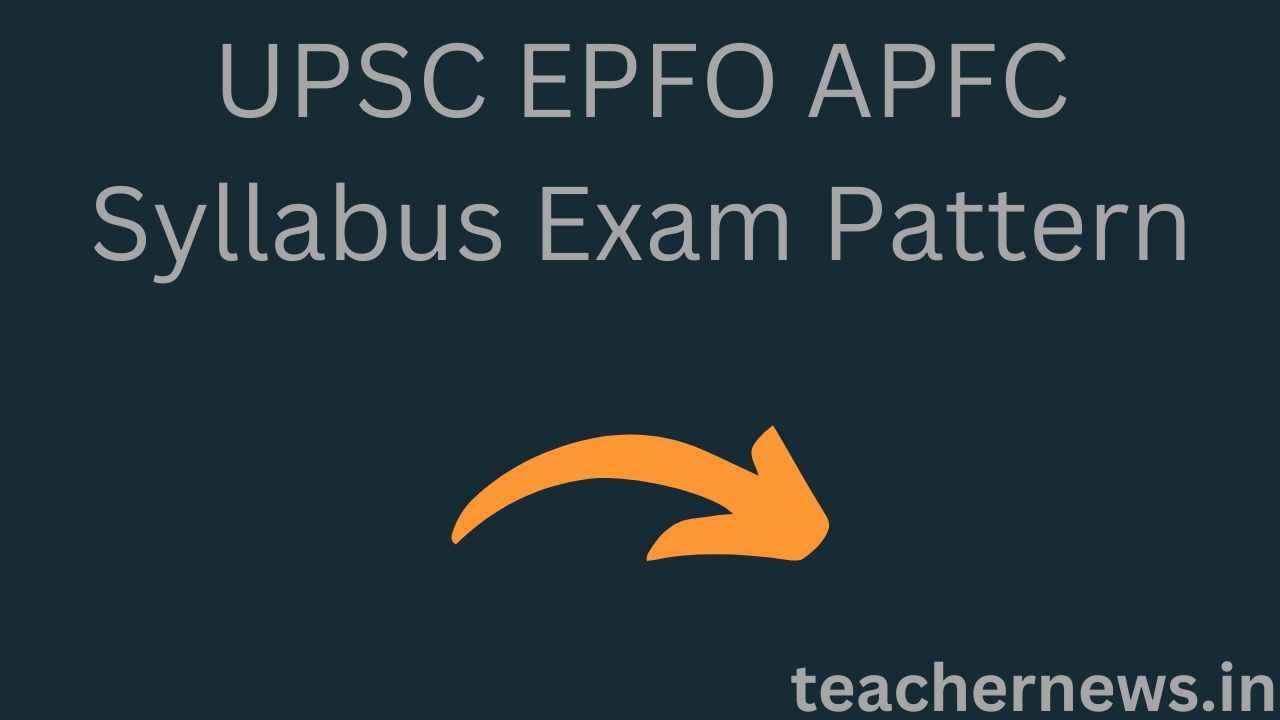UPSC EPFO APFC Syllabus Exam Pattern 2023 : Eligibility,Benefits,All Information Available Here
UPSC EPFO APFC Syllabus Exam Pattern 2023. The UPSC EPFO (Union Public Service Commission Employees’ Provident Fund Organisation) exam is a recruitment exam conducted by the Union Public Service Commission (UPSC) for the selection of candidates for the post of Enforcement Officer/Accounts Officer in the Employees’ Provident Fund Organisation (EPFO), Ministry of Labour and Employment. The exam is conducted annually and consists of two stages: a written exam and an interview. The written exam consists of two papers – Paper 1 and Paper 2 – and is conducted in offline mode. Paper 1 consists of objective-type questions while Paper 2 consists of descriptive questions.
Candidates who qualify in the written exam are called for the interview stage, which is conducted to assess the candidate’s personality, communication skills, and other relevant factors.
AP Income Tax Software || TG Income Tax Software
The eligibility criteria for the UPSC EPFO exam include a minimum age limit of 21 years and a maximum age limit of 30 years. Candidates should also possess a degree from a recognized university or institute.
The UPSC EPFO exam is extremely competitive, so candidates should thoroughly prepare for it by studying the syllabus and practicing previous year question papers. Candidates can also join coaching classes or online courses to enhance their preparation. The official website of UPSC provides all the necessary information related to the exam, including the application process, exam dates, and syllabus.

UPSC EPFO APFC Syllabus Overview 2023
Here is an overview of the UPSC EPFO APFC (Assistant Provident Fund Commissioner) syllabus in table format:
| Paper | Subject/Topic | Marks |
|---|---|---|
| Paper 1 | General English | 100 |
| Paper 2 | General Studies, Accounting and Finance | 100 |
| General Studies | 25-30 questions | |
| Indian Polity | 10-12 questions | |
| Indian Economy | 8-10 questions | |
| General Mental Ability and Quantitative Aptitude | 25-30 questions | |
| Accounting and Auditing | 40-45 questions | |
| Basic Knowledge of Industrial Relations and Labour Laws | 8-10 questions | |
| Basic Knowledge of Computer Applications | 10-12 questions |
Note: The above table provides an overview of the UPSC EPFO APFC syllabus. Candidates are advised to refer to the official syllabus provided by the Union Public Service Commission for detailed information and topic-wise weightage of marks
UPSC Eligibility For EPFO |
The eligibility criteria for UPSC EPFO (Union Public Service Commission Employees’ Provident Fund Organisation) exam are as follows:
- Nationality: The candidate must be an Indian citizen, a Nepalese or Bhutanese subject, or a Tibetan refugee who arrived in India before January 1, 1962, with the specific intent of permanently settling in India.
- Age Limit: The candidate should be between 21 and 30 years of age as of January 1 of the exam year. There are age relaxations for candidates belonging to reserved categories, as per the government rules.
- Educational Qualification: The candidate should possess a degree from a recognized university or institute. Candidates who have obtained professional and technical qualifications, such as MBA, CA, ICWA, LLB, etc., are also eligible to apply.
- Experience: The candidate should have at least two years of experience in Administration, Accounts, or Legal matters in any government or private organization.
- Physical Standards: The candidate must be physically fit according to the physical standards for Indian government employees.
Note: Candidates who meet the above eligibility criteria can apply for the UPSC EPFO exam. It is important to note that meeting the eligibility criteria does not guarantee selection for the post of Enforcement Officer/Accounts Officer in the Employees’ Provident Fund Organisation (EPFO), Ministry of Labour and Employment. Candidates have to go through a selection process, which includes a written exam and an interview.
The Benefits of UPSC EPFO |
The UPSC EPFO (Union Public Service Commission Employees’ Provident Fund Organisation) exam provides several advantages to the candidates who clear it. Some of the advantages of clearing the UPSC EPFO exam are:
- Job Security: Candidates who clear the UPSC EPFO exam are appointed as Enforcement Officer/Accounts Officer in the Employees’ Provident Fund Organisation (EPFO), which is a government organization. This provides job security and stability to the candidates.
- Good Salary: The salary package for the Enforcement Officer/Accounts Officer in the EPFO is lucrative and includes several benefits and allowances.
- Growth Opportunities: The EPFO offers several opportunities for career growth and promotion to its employees. This allows candidates to progress in their careers and take on more challenging roles.
- Social Status: Working as an Enforcement Officer/Accounts Officer in the EPFO provides social status and recognition in the society.
- Opportunity to Serve the Nation: Working in a government organization like the EPFO provides candidates with the opportunity to serve the nation and contribute to the country’s development.
- Work-Life Balance: The EPFO provides its employees with a good work-life balance and allows them to maintain a healthy balance between their personal and professional lives.
UPSC EPFO Exam Pattern |
The UPSC EPFO (Union Public Service Commission Employees’ Provident Fund Organisation) exam is divided into two parts: a written examination and an interview. The written exam is an objective type test with two papers worth 100 points each.The total duration of the exam is 4 hours. The exam pattern for the UPSC EPFO exam is as follows:
Stage 1: Written Exam
Paper 1: General English
Total Marks: 100
Total Questions: 100
Duration: 2 hours
Paper 2: General Studies, Accounting & Finance
Total Marks: 100
Total Questions: 100
Duration: 2 hours
Note: Paper 2 is a qualifying paper with a minimum passing mark of 45% for general category candidates and 40% for candidates belonging to reserved categories.
Stage 2: Interview
Candidates who clear the written exam are called for an interview, which carries a total of 100 marks. The interview assesses the candidate’s personality, communication skills, and knowledge of the subject.
The final selection of candidates is based on their performance in both the written exam and the interview.
The UPSC EPFO exam pattern tests the candidate’s knowledge of English, general studies, accounting, and finance. It also assesses their personality and communication skills. Candidates who are well-prepared and have a good understanding of the exam pattern can perform well and secure a good rank in the exam.
| Official Website | Click Here |
1)What is the syllabus for UPSC EPFO APFC Paper 1?
Ans The syllabus for Paper 1 of the UPSC EPFO APFC exam includes comprehension, antonyms, synonyms, grammar, vocabulary, and so on.
2)What is the syllabus for UPSC EPFO APFC Paper 2?
Ans General Studies, Accounting, and Finance make up Paper 2 of the UPSC EPFO APFC exam. General Studies topics include Indian Polity, Indian Economy, General Mental Ability, and Quantitative Aptitude, while Accounting and Finance topics include Accounting and Auditing, Basic Knowledge of Industrial Relations and Labour Laws, and Basic Knowledge of Computer Applications.
3)Is the UPSC EPFO APFC exam subject to negative marking?
Ans Yes, there is a penalty for incorrect responses in objective-type questions. As a penalty, one-third of the marks assigned to that question will be deducted for each incorrect answer.
4)Where can I find the detailed UPSC EPFO APFC exam syllabus?
Ans The UPSC EPFO APFC exam syllabus is available on the Union Public Service Commission’s official website.
5)How should I study for the UPSC EPFO APFC exam?
Ans Candidates must understand the syllabus and exam pattern in order to prepare for the UPSC EPFO APFC exam. To improve their speed and accuracy, they should also practice solving previous year question papers and take mock tests. Candidates can also consult standard textbooks and study materials for each subject.






